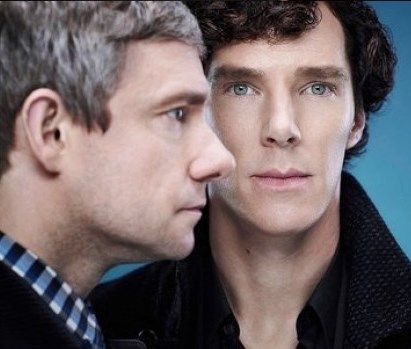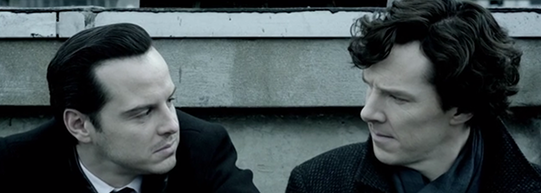
BBC Sherlock Fan Forum - Serving Sherlockians since February 2012.
- JaneCo
- Mycroft's Contact
 Offline
Offline 
- Registered: April 22, 2012
- Posts: 459
Deducing the character of John Watson
Decided to post this link here although it could equally well fit elsewhere. If anyone feels strongly, please move to appropriate thread.
---------------------------------------------------------------------------------------------------------------------------------------------
- KeepersPrice
- Official Blogger
 Offline
Offline 
- From: Andover, Massachusetts
- Registered: June 8, 2012
- Posts: 1,721
Re: Deducing the character of John Watson
Thanks for posting the link. It was an excellent analysis! One thing it mentions that I've thought about since seeing the episode, it says John goes back for his gun before proceeding to Baker Street because of the
"Could be dangerous" line. I saw retrieving the gun as perhaps just a bit more than that. John had just been "abducted" by a strange and mysterious man calling himself Sherlock's arch enemy. He'd also just been warned off Sherlock by Sally Donovan who thinks he's a freak and a psychopath and a potential future murderer. Strange information indeed to process in such a short space of time. John is intrigued enough to go back to Baker Street, but perhaps also apprehensive about what he's really getting into. (You can see that moment of doubt when he realizes Sherlock has the Pink Lady's case). At this early point in their relationship he may have decided to stop for the gun in case he needed to protect himself from Sherlock Holmes.
---------------------------------------------------------------------------------------------------------------------------------------------
And I said "dangerous" and here you are.
You. It's always you. John Watson, you keep me right.

- Davina
- Moderator
 Offline
Offline 
- From: The Only Way is Essex UK
- Registered: February 9, 2012
- Posts: 9,714
Re: Deducing the character of John Watson
This is a well written analysis. At the risk of nit-picking John does not only use his gun in self-defence, he uses it to help protect others as well as himself.
Other observations about John:
1. He never really lies at any time during the series.
2. When he has his hallucination in the lab at Baskerville he almost collapses and thinks he is going to die, whereas Sherlock cries and thinks he is losing his mind (very different responses to the same stimulus).
3. Jim knows that John is potentially dangerous, that is why in Kitty's flat he says 'You're a good man (he is). Don't hurt me' (he knows he can and might do so).
4. He really doesn't like the use of the phrase 'batchelor John Watson' in the newspaper article because he knows exactly what they are trying to imply. He asks 'what are they trying to imply?' but it is a rhetorical question.
5. He initially defends Jim from the accusation by Sherlock that he is gay by saying 'I put product in my hair'. Thereby basically stating that if putting product in your hair is a sign that someone is gay then he too must be gay and he knows he isn't.
6. As in the canon he has a number of girlfriends but so far these have not been of long-standing due, in the main, one way or another, to the presence of Sherlock.
Your views on these folks?
![]()
---------------------------------------------------------------------------------------------------------------------------------------------
Don't make people into heroes John. Heroes don't exist and if they did I wouldn't be one of them.

- MaggieM
- Not A Hero
 Offline
Offline 
- From: los angeles
- Registered: September 25, 2012
- Posts: 53
Re: Deducing the character of John Watson
John is the soul of the outfit; a kind, decent, honorable man and yet certainly not a wuss. Moriarty should have been scared of him.
- NW16XE
- John's Army
 Offline
Offline 
- From: USA
- Registered: September 2, 2012
- Posts: 366
Re: Deducing the character of John Watson
Martin describes his character as Sherlock's 'moral compass'.
-----------------------------------------------------------------------------
What do 'real' people have, then, in their 'real' lives?
So we go round the sun; if we went round the moon, or round and round the garden like a teddy bear, it wouldn't make any difference.
The consolation of imaginary things is not imaginary consolation. -- Roger Scruton
- besleybean
- Threatened Knighthood
 Offline
Offline 
- From: Carnoustie, Angus, Scotland.
- Registered: October 4, 2012
- Posts: 21,376
Re: Deducing the character of John Watson
I don't think it's just that.
I don't know if Sherlock was initially only looking for flatmate, but he certainly quickly realises John is a good sidekick.
John's medical and military backgrounds are useful and he is also a decent bloke.
---------------------------------------------------------------------------------------------------------------------------------------------------------------
- Ivy
- High Functioning Sociopath
 Offline
Offline 
- From: Berlin, Germany
- Registered: July 31, 2012
- Posts: 2,330
Re: Deducing the character of John Watson
Awww look at this, it's really interesting but very sad as well.
- besleybean
- Threatened Knighthood
 Offline
Offline 
- From: Carnoustie, Angus, Scotland.
- Registered: October 4, 2012
- Posts: 21,376
Re: Deducing the character of John Watson
Yes and Sherlock has done it..
---------------------------------------------------------------------------------------------------------------------------------------------------------------
- saturnR
- Mycroft's Contact
 Offline
Offline - From: sydney
- Registered: September 3, 2012
- Posts: 528
Re: Deducing the character of John Watson
New link (coz link in original post doesn't work):
- besleybean
- Threatened Knighthood
 Offline
Offline 
- From: Carnoustie, Angus, Scotland.
- Registered: October 4, 2012
- Posts: 21,376
Re: Deducing the character of John Watson
A good article and I agree.
---------------------------------------------------------------------------------------------------------------------------------------------------------------
- Mary Me
- High Functioning Sociopath
 Offline
Offline 
- From: Germany, Bonn
- Registered: January 8, 2013
- Posts: 3,250
Re: Deducing the character of John Watson
Yes, this article hits the nail on the thumb. Perfectly sound analysis.
~~~~~~~~~~~~~~~~~~~~~~~~~~~~~~~~~~~~~~~~~~
"Falling is just like flying, except there’s a more permanent destination."
"Sherlock Holmes is a great man, and I think one day—if we’re very very lucky—he might even be a good one."
"Would you like to-"
"-have dinner?"
"-solve crimes?"
"Oh"

- butterfly grl
- John's Army
 Offline
Offline 
- From: at work most likely, in Texas
- Registered: May 16, 2013
- Posts: 300
Re: Deducing the character of John Watson
I believe that Sherlock realizes at some point that he needs John. They work out a "system" where if Sherlock tries to get info out of someone, he screws it up - using threats or some such, whereas, John can quietly talk to them, and get the info they need.
Also, John is often the one to mention something that leads Sherlock to the correct conclusion. The cabby talks to the victims....the vegetarian restaraunt with a bill for meat.....
-------------------------------------------------------------------------------------------------
Beware of dragons for you are crunchy and go well with ketchup
Dr. Horribles sing along blog
You people all have to learn
This world is going to burn
Burn
(yeah, it’s two r’s. H, O, R, R, yeah right.)
Burn
- Be
- Unregistered
Re: Deducing the character of John Watson
I specifically like the scene in Hounds when they are in Baskerville and Sherlock has to show Mycroft's identity card to Major Barrymore. "Clearly not Mycroft Holmes". Sherlock is nearly defeated and everything looks as if they got caught. Even Sherlock hasn't got a quick answer to this.
Now we get to see John's nerves of steel. He simply goes on with the bluff: "A mistake. Has to go into the report". John is really strong is this moment. He steps in when Sherlock needs help. With this intervention he plays for time and they both succede.
- reality check
- Not A Hero
 Offline
Offline 
- From: Germany
- Registered: June 9, 2013
- Posts: 50
Re: Deducing the character of John Watson
Good job, this analysis. :o) Thank you for sharing.
I quite like the phrase of the 'moral compass'. There are certain scenes - the cufflinks etc. - in which John reminds Sherlock to behave 'socially'.
In the ending of the first episode Mycroft's commenting: Interesting, that soldier fellow. Could be the making of my brother - or make him worse than ever...
Well, I count on the first. :o)
In my life I have found two things of priceless worth - learning and loving. Nothing else - not fame, not power, not achievement for its own sake - can possible have the same lasting value. For when your life is over, if you can say 'I have learned' and 'I have loved', you will also be able to say 'I have been happy'.
~ Arthur C. Clarke ~
- sj4iy
- High Functioning Sociopath
 Offline
Offline 
- From: USA
- Registered: June 12, 2013
- Posts: 2,692
Re: Deducing the character of John Watson
reality check wrote:
Good job, this analysis. :o) Thank you for sharing.
I quite like the phrase of the 'moral compass'. There are certain scenes - the cufflinks etc. - in which John reminds Sherlock to behave 'socially'.
In the ending of the first episode Mycroft's commenting: Interesting, that soldier fellow. Could be the making of my brother - or make him worse than ever...
Well, I count on the first. :o)
I wonder if Sherlock will fall into the latter without him?
__________________________________________________________________Bigby: Will you shut up?
Colin: Well, maybe if my throat wasn’t so parched, I wouldn’t have to keep talking.
Bigby: Wait, that doesn’t make se-
Coline: Just give me a drink, please.
- reality check
- Not A Hero
 Offline
Offline 
- From: Germany
- Registered: June 9, 2013
- Posts: 50
Re: Deducing the character of John Watson
sj4iy wrote:
reality check wrote:
Good job, this analysis. :o) Thank you for sharing.
I quite like the phrase of the 'moral compass'. There are certain scenes - the cufflinks etc. - in which John reminds Sherlock to behave 'socially'.
In the ending of the first episode Mycroft's commenting: Interesting, that soldier fellow. Could be the making of my brother - or make him worse than ever...
Well, I count on the first. :o)I wonder if Sherlock will fall into the latter without him?
Possibly.
(Oh, hopefully I'm able to put my thoughts into reasonable english :o)
I think, it's absolutely neccessary for the further development of a person/of a character, to have somebody upon your side, who queries you and your behaviour/decisions, whatever, because this person wants the best for you.
And with that, this one should bring the best out of you. Vice versa. No matter if it's friend or partner.
I think, in the Sherlock/John case this is beautifully shown in the series.
Last edited by reality check (June 17, 2013 8:01 pm)
In my life I have found two things of priceless worth - learning and loving. Nothing else - not fame, not power, not achievement for its own sake - can possible have the same lasting value. For when your life is over, if you can say 'I have learned' and 'I have loved', you will also be able to say 'I have been happy'.
~ Arthur C. Clarke ~
- Be
- Unregistered
Re: Deducing the character of John Watson
Mycroft's commenting: Interesting, that soldier fellow. Could be the making of my brother - or make him worse than ever...
I am interested in this comment, too. It might be some kind of foreshadowing from Gatiss.
John on the one hand makes Sherlock vulnerable because he will become his pressure point and needs protection. On the other hand Sherlock gets support from John and insight into feelings. John can also be used as a decice to get informations about the drug or as a bait for Moriarty (I am sorry for oversimplifying.)
What really bothered me is the meaning of John's blog in this context.
John is the making of Sherlock with the blog because Sherlock got more media attention and became famous. More interesting cases and more clients.
The blog is also something potentially dangerous. When asked whether Sherlock liked it he said. "No." We are supposed to think that Sherlock didn't want people to know that he doesn't know some basic stuff everybody else knows. I don't think this is wounded vanity because Sherlock doesn't care what people think.
The case with the supernova occured in close and temporal connection with John's blog post about Sherlock's lacking knowledge as if somebody read the blog and immediately thought "Ha, ha, gotcha. Let's use this against Sherlock ." We know that Moriarty read the blog.
The next bit of personal information John told the world about Sherlock was about doubt. And doubt is a central theme of TRF, too.![]()
- Russell
- High Functioning Sociopath
 Offline
Offline - From: Hello, Ohio!
- Registered: November 26, 2012
- Posts: 2,991
Re: Deducing the character of John Watson
Be wrote:
Mycroft's commenting: Interesting, that soldier fellow. Could be the making of my brother - or make him worse than ever...
I am interested in this comment, too. It might be some kind of foreshadowing from Gatiss.
John on the one hand makes Sherlock vulnerable because he will become his pressure point and needs protection. On the other hand Sherlock gets support from John and insight into feelings. John can also be used as a decice to get informations about the drug or as a bait for Moriarty (I am sorry for oversimplifying.)
What really bothered me is the meaning of John's blog in this context.
John is the making of Sherlock with the blog because Sherlock got more media attention and became famous. More interesting cases and more clients.
The blog is also something potentially dangerous. When asked whether Sherlock liked it he said. "No." We are supposed to think that Sherlock didn't want people to know that he doesn't know some basic stuff everybody else knows. I don't think this is wounded vanity because Sherlock doesn't care what people think.
The case with the supernova occured in close and temporal connection with John's blog post about Sherlock's lacking knowledge as if somebody read the blog and immediately thought "Ha, ha, gotcha. Let's use this against Sherlock ." We know that Moriarty read the blog.
The next bit of personal information John told the world about Sherlock was about doubt. And doubt is a central theme of TRF, too.
Wow... definitely.... plus all the comments about John being a compass plus holding his own... one of the big things I always loved about their version. I agree what you said about the blog... really interesting though, that while we could infer a keep-it-simple obvious understanding about Mycroft's words (which I love that he said in portrayal of the pair), with all the chat on here about the relationships between them, I was just musing that we don't quite know what Mycroft means by 'worse'.
What does he consider by 'worse'... that John will, as you said, be both the cause and effect for Sherlock with a number of things, and be the reason Sherlock grows more vulnerable/human since Mycroft sees he's actually made a friend/partner in crime ('worse' in the eyes of a Holmes, or a 'the making of Sherlock' 'good' thing, considering the trouble he knows they've both had with it? recall their conversation in the morgue, after all). Or worse in that now Sherlock has a friend and a willing audience to boost him along, he might be even more obstinate/full of himself than ever, which annoys Mycroft.
_________________________________________________________________________
We solve crimes, I blog about it, and he forgets his pants. I wouldn't hold out too much hope!
Just this morning you were all tiny and small and made of clay!
I'm working my way up the greasy pole. It's… very greasy. And… pole-shaped.
- Be
- Unregistered
Re: Deducing the character of John Watson
Exactly Russell,
IMO, Sherlock (like every human being) has the potential to walk on the bright side or on the dark side. Or a bit of both at the same time. Like yin and yang.
He said it himself when talking about criminals. "Good job I am not one of them."
John is in Mycroft's eyes an additional factor. One doesn't know which side of Sherlock he will enhence. Probably both.
John's own strength steps up Sherlock's game. (Kind of Benedict's quote about Martin.) Ever since the pool incident Sherlock knows that Moriarty is now aware ot their connection and will use it against him.
The very first time we get to see this kind of duality is when John is called form the other side of London to send a message. John is used as a device. When the arch enemy tried to bribe John to spy on Sherlock (parallel to the Moriarty threat), What did Sherlock do? Fight it? Have a row with Mycroft?
No. Sherlock does intellectual martial arts: He uses the energy of the enemy John has unintentionally evoked against the attacker. He does the same in TRF with John. He uses him as an extension of his own person. Like a weapon or device.
1. attract Moriarty's attention by appearing in the newspapers (photos)
2. lure him into agression (here I am, see what we can do, solve crimes...Why does it upset you?)
3. wait for the attack of the enemy (keep a low profile, little case this week)
4. play along, don't fight when the attacker is strong, go with it (solve the fairy tale case, in Kitty's flat being passive)
5. seek out a weakness, build a trap with John working as bait
6. surprise the enemy with an unexpected movement (don't think for one second...)
7. distrub the balance of the enemy
8. let the enemy fall through his own energy (Moriarty wants to kill and yet kills himself)
Textbook of martial arts. I love it.

 1 of 1
1 of 1